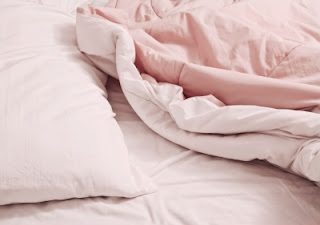Getting the Zzz's
I have great difficulty sleeping.
My bipolar disorder produces intense insomnia during manic episodes, and I have a lengthy nighttime routine to prepare me to get to sleep. This lasts for three hours before lights out and includes a lot of reading and a long bubble bath. Most of the time when I use this routine, I don't have much trouble getting to sleep.
But I need backup plans and assistance to encourage tiredness. Enter aromatherapy, essential oils, natural supplements, cautious screen time, and sleep apps on my phone.
My mother is an acupuncturist, and she prescribes essential oils to her patients. I use them in conjunction with Western medicine to supplement the medication I take. For me, they serve as aromatherapy as well as the medicinal benefits of the oils themselves. I have different blends I use in a diffuser to put the oil in the air so I can both smell it and absorb its properties by breathing it in. I also have several oils I put on my body every night to help with sleep. You should see the line of roll-on bottles in my medicine cabinet that I use every day!
Along with my aromatherapy, I also have a backup nutritional supplement that's a natural hormone the body produces—melatonin. I have chewable tablets that usually kick in within about fifteen minutes. The problem with taking melatonin is if I take it too often, like every day for a long period, my body will actually stop producing it on its own. So I have to reserve it for backup in case I don't get sleepy by other means.
Unfortunately, computer and phone screens use blue light which can keep us awake. So, I have my computer set to switch to warm light at 9:00 p.m. and switch back at 6:00 a.m. I don't generally use my computer after my bath, but in case I do, the light will hopefully be easier on me.
I recently bought a weighted blanket that weighs fifteen pounds total and is the size of the top of a twin mattress. It helps me sleep better—I get to sleep easier and roll around less. They can ease anxiety as well, and that's also helpful.
Finally, I use a sleep app that measures my sleep cycles, uses a smart alarm that wakes me in light sleep, and contains lullabies that play for a specified amount of time while I fall asleep. I found a harp playing a snippet of Pachelbel's "Cannon in D" that repeats. I play that each night. With this app, I can see how my efforts to change my sleep habits are affecting my sleep patterns. It keeps track of trends, like the average number of hours I sleep over a period of time, when I go to bed and get up on average, and how often I use the app, among others. I've loved the app and found it very useful.
One of the things that helps when the insomnia gets severe is nature sounds on headphones. But for me, what's the most relaxing is the clack-clack of a train. Here's my favorite black-screen video.
Bad sleep affects everything in a person's life, and as someone who's gone seventy hours without sleep, I can attest to how important good sleep is. An extensive arsenal to combat the insomnia I get with mania helps me stay rested and keep the mania from getting worse.
Photo Credit Feelart via freedigitalphotos.net



Comments
Post a Comment